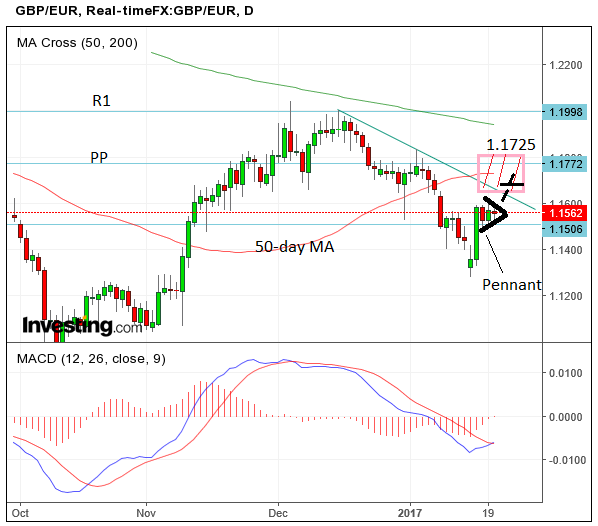UK GBP/EUR Exchange Rate Predictions: Pennant on Chart Suggests Further Gains

Pound Sterling is looking to test the key 1.16 level against the Euro on Monday January 23.
The exchange rate has enjoyed a stronger tone following Theresa May’s Brexit speech in which a more realistic vision of Brexit was set out bringing to an end months of uncertainty on how the Government would play its hand.
Since an initial leap higher, the conversion has been consolidating in a narrow range which has formed into what looks like a chart pattern called a pennant, as in the triangular flags which flew from medieval castle tops.
The pennant forms after a sharp appreciation, which represents the ‘pole’ (ie which holds up the ‘pennant’).
It is a continuation pattern, which indicates the likelihood of an extension higher following a breakout from the triangular consolidation range.
In relation to the GBP/EUR chart pennant pattern, the move higher is usually a similar length to the pole, which in this case indicates a likely move up to a target at 1.1770.
The problem on GBP/EUR, however, is that that there is a resistance zone (box of red hatching) composed of two tough levels of resistance which are expected to act as an obstacle to further upside.
These include a trendline at 1.1670 and the 50-day moving average (MA). The MA is the most significant at 1.1728.
A break above the trendline, signaled by a move above 1.1680 would, therefore, be expected to reach the 1.1725 level, just below the MA.
The MACD momentum indicator in the lower pane is showing the potential for a turnaround after crossing above its signal line, but it has not risen high enough yet to support a bullish outlook.
Data + Events for the Pound this Week
The Supreme Court Ruling on Article 50 will be released on Tuesday at 09:30 GMT.
Since Prime Minister May has already said she will be opening up Brexit to a parliamentary vote, the decision will only have a limited impact.
There is, however, a risk that the law lords could say the devolved parliaments of the other parts of the United Kingdom – Scotland, Wales and Northern Ireland - may also be allowed a vote, which could delay the whole Brexit process.
It is therefore possible that devolved parliaments might vote against triggering Article 50 as an expression of their opposition to Brexit.
“If the Scottish and Northern Irish devolved parliaments are entitled to vote on the matter, this could delay Brexit further. In addition, it is possible that local politicians could vote to reject the proposal on behalf of their constituents,” said Siobhan Fenton, writing for the Independent.
This will introduce a fresh layer of uncertainty for the UK and we believe it would actually be negative for the Pound which runs counter to the currency's reaction when the initial rulings on Article 50 were made by the High Court in 2016.
The big data release next week will be Q4 GDP revisions, out at 9.30 GMT, which is expected to show growth of 2.1% year-on-year (yoy) and 0.5% month-on-month (mom).
"Our economists are looking for 0.5%q/q, as a robust contribution from the service sector is expected once again. Survey indicators remain healthy, suggesting that some of that momentum is carrying in to 2017. Consensus is now looking for a shallower and longer hit to UK activity as a result of EU exit," says Ryan Djajasaputra at Investec.
Data + Events for the Euro
Manufacturing and Services PMI’s are out on Monday, January 23 at 9.00, and are expected to show a rise in Services to 53.9 from 53.7 and in Manufacturing to 54.8 from 54.9 previously.
"This week’s flash PMIs are worth watching to see whether the momentum from late 2016 has continued into Q1 2017. Q4 saw particularly strong survey data, and so far early signs point to that continuing. Our economists look for the PMIs to hold at the recent highs," says Elsa Lignos at RBC Capital Markets.
Wednesday, January 25, sees the release of the German Ifo Sentiment Survey, which is forecast to come out at 111.2 in January (Business Climate Survey)– a two basis point rise from the previous, November, result.
Italy’s Constitutional Court will on Tuesday rule on the country's electoral law.
The Court is expected to cancel the part of the law that gives the winning party a bonus allocation of seats, at which point Parliament will have to start working on a new law.
"The Court’s instructions on why it rules parts of the law as illegal will help to dictate when new Italian elections might take place," says a note from TD Securities.
Any hint of fresh elections will only increase the political risk premium in the Euro during 2017.






